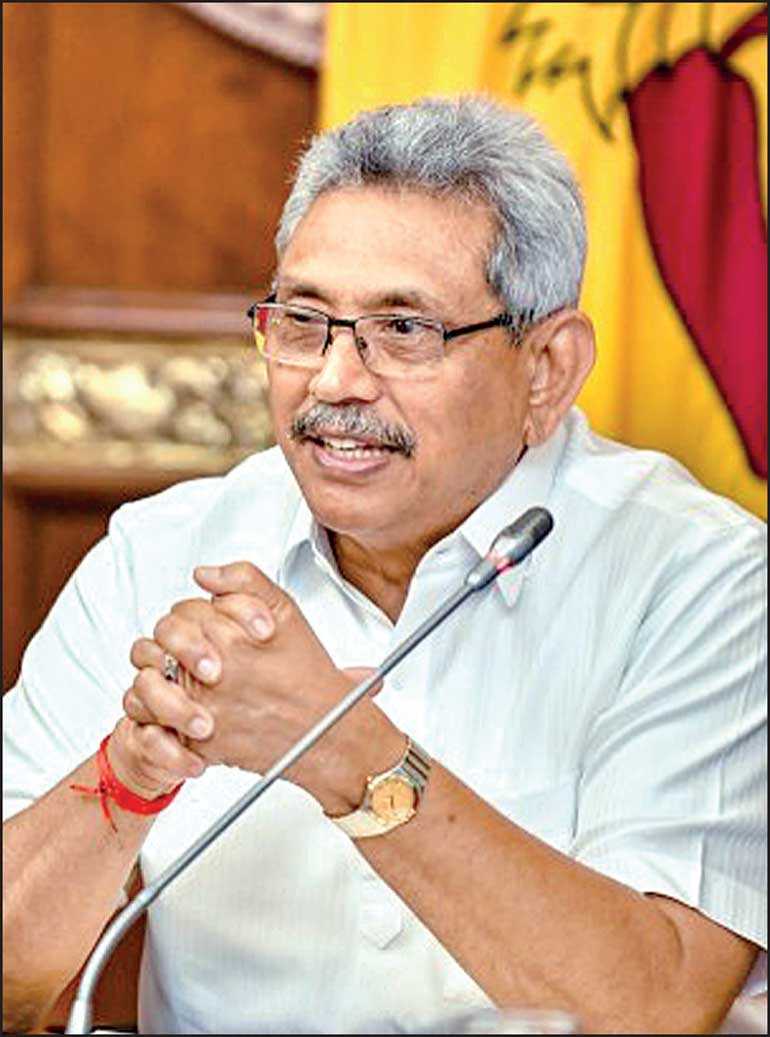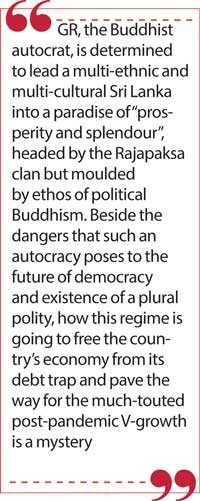Wednesday Feb 25, 2026
Wednesday Feb 25, 2026
Thursday, 15 October 2020 00:00 - - {{hitsCtrl.values.hits}}

Given the perilous state of the economy, an autocratic regime in a plural society can only survive with a policy of divide and rule. One can see plenty of signs of that policy since Gotabaya Rajapaksa became President
Nothing can be kept a secret in Sri Lanka, and so is the supposed to be confidential document handed over to the Speaker of Parliament from the Supreme Court. Even before the Speaker could place that  document before the House, on 20 October, it was already there on the internet, and lawyers, who appeared on behalf of the appellants, were fuming at their “disappointment”.
document before the House, on 20 October, it was already there on the internet, and lawyers, who appeared on behalf of the appellants, were fuming at their “disappointment”.
It appears from what has been reported, that with few amendments at the committee stage, 20A has got the green light from the Supreme Court and scheduled to be passed with two-thirds majority and without any need for referendum. However, opposition is mounting from civic and political groups putting pressure on Parliamentarians to deny the Bill the necessary majority. If the Bill passes there is nothing to prevent the emergence of autocracy under GR and his Rajapaksa clan. GR wants strong executive powers to “deliver” what he promised.
What did he promise to deliver? He promised virtually a Valhalla with “prosperity and splendour” within a “secure, disciplined, virtuous and lawful” society. To provide security and maintain discipline, in other words law and order, he has commandeered the tri-forces, and cautioned the Judiciary not to put unnecessary hurdles in his way. The Judiciary has demonstrated its compliance by its latest act regarding 20A. To infuse virtuousness, GR has sought regular advice and guidance solely from the Buddhist and not from any other hierocracy.
The two overriding features of GR autocracy will be: (a) that it will be family-oriented and clannish, and (b) that it will be moulded by political Buddhism, an outgrowth of the anti-colonial Buddhist cultural awakening of late 19th century, which became politically mixed up with Sinhala ethno-nationalism in the 20th and metamorphosed into a movement for Buddhist Sinhala supremacy in 21st.
The Buddhist autocrat
GR, the Buddhist autocrat, is determined to lead a multi-ethnic and multi-cultural Sri Lanka into a paradise of “prosperity and splendour”, headed by the Rajapaksa clan but moulded by ethos of political Buddhism. Beside the dangers that such an autocracy poses to the future of democracy and existence of a plural polity, how this regime is going to free the country’s economy from its debt trap and pave the way for the much-touted post-pandemic V-growth is a mystery. The country is financially bankrupt. Even to finance the coming Budget, the Government is seeking a new loan of $ 500 million from China. Until now, the rulers and their economic and financial experts have not come out with a comprehensive set of policies or strategies, let alone to set a time line to free the country from debt and achieve economic independence.
There have been plenty of ad hoc announcements by GR and his ministers about import substitution, agricultural reformation, foreign direct investment, employment-oriented education and promotion of industries to diversify the economy and increase exports. But how these segments are to be tied together while taking into account their linkage effects, in an overall working plan or strategy with sufficient incentives is not at all clear.
The economy is in dire straits
The country needs years of sustained economic growth to free itself from debt and achieve economic independence. With crippling debt and the need to borrow more to finance budget expenditures the economy is in dire straits. 
True, it has so far managed to avoid debt default, but that was made possible not by earning surpluses through growth but by incurring more and more debt. Debt incurred from one source was serviced through debt incurred from another. As a result, debt to GDP ratio is expected to reach 100% by the end of this year.
The pandemic-driven global recession has made the situation even worse and any economic recovery appears more painful and tardy. The latest prediction by World Bank for the economy to shrink by 6.7% in 2020-21, and Moody’s earlier downgrading of the country’s credit rating by three notches, have sent a warning signal to foreign investors and lenders. Meanwhile, the pandemic virus shows no sign of disappearing.
The economic challenges are too many and too complex and they need a coordinated and cooperative effort to meet. Autocracy is the last thing the country needs. An autocracy surrounded by a cartel of Buddhist supremacists, clannish power brokers and greedy capitalists is a recipe for political conspiracies, economic collapse and social unrest.
Population, participation and productivity
The three fundamental Ps of economic growth are population, participation and productivity. There are no better assets to an economy than its population. It is the people who produce and benefit from the economy and without them what use of an economy? When that population is multi-ethnic, multi-cultural and multi-talented as in Sri Lanka that diversity is a bonus given by history, and which should be harnessed for prosperity and development.
The larger the population, the more diverse its expertise and greater its participation, the greater its productivity and the economy will be prosperous. Under the emerging autocracy this diversity is in danger of being homogenised, under the aegis of a supremacist ideology to which GR is committed. This is why 20A is also a death-knell to the much-wanted 13th Amendment.
There is a growing belief within the ruling cartel that economic growth and development should mostly if not totally be a Sinhala-Buddhist phenomenon and the cartel has no room to incorporate other ethnic communities into this effort.
GR autocracy will therefore keep the population divided with differential treatment which, combined with its characteristic absence of democratic freedom, liberty and natural justice, will discourage dedicated participation and deprive the economy of opportunities to increase productivity – essential ingredients for economic revival and growth, not normally emphasized by economic theoreticians.
Given the perilous state of the economy, an autocratic regime in a plural society can only survive with a policy of divide and rule. One can see plenty of signs of that policy since GR became President.
Now, with autocratic powers grabbed rather ironically through the democratic process, how GR and his regime are going to navigate through competing pressures from foreign lenders without (a) mortgaging the territorial sovereignty of the country, and (b) delivering at least a modicum of economic comfort to the people, will be the most absorbing drama to be watched in this decade.
(The writer is attached to the School of Business & Governance, Murdoch University, Western Australia.)